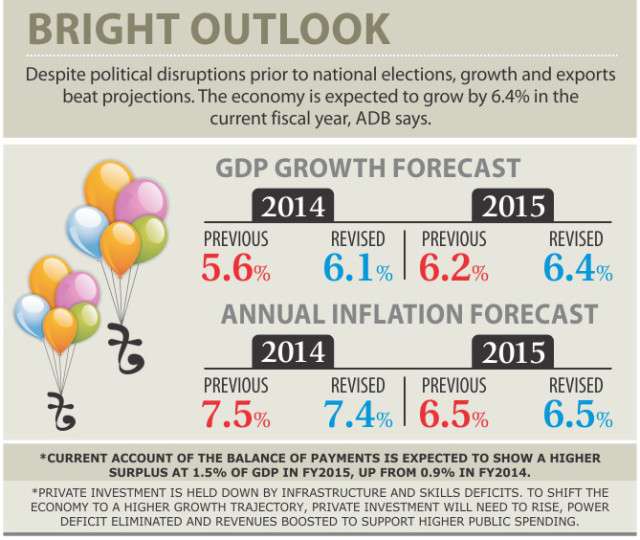Asian Development Bank (ADB) President Takehiko Nakao on Wednesday said that Bangladesh and Sri Lanka are growing at a much faster pace than Pakistan and has asked the country to address governance issues and pursue sound economic reforms to realise the great potential. Addressing a press conference along with Finance Minister Ishaq Dar at the end of his two-day visit to Pakistan to attend Central Asia Regional Economic Co-operation’s (CAREC) 15th ministerial conference here, Nakao said “to make the country investment-friendly, reforms should be made and through reforms, country would be made appropriate for investment”.
ADB and Pakistan also signed an agreement ahead of a joint briefing titled regional improvement of border service from three points – Chaman-Torkham-Wagha – with a total cost of $302 million that includes $250 from the ADB. The ADB President stated real challenges for Pakistan are how to maintain the achieved reforms and to undertake further reforms in power sector as well as ensure privatisation of State-Owned Companies (SOEs). Pakistan, he said, is also faced with the challenges of how to attract foreign and local investors and overcome the challenge of security.
“Bangladesh and Sri Lanka are growing at a much faster pace than Pakistan. ADB president said although there are challenges, there is also great potential,” he said, adding the governance issues, such as corruption, tax evasion and money laundering are important for Pakistan as for any other country. There is no such issue in ADB because of great involvement of scrutiny in procurement as well as zero tolerance for corruption. However, he acknowledged the government is making serious efforts against tax evasion and corruption.
The ADB President said that “we have been supporting Pakistan in projects as well as budgetary support. We have also supported Pakistan through transport and energy sector and will continue to do so and if required.” He said that ADB has not made any commitment to provide financing for Diamer-Bhasha Dam because the project is huge and without any equity partner it is beyond ADB’s range. “Construction of the project is very important for energy and irrigation,” he said, adding that an operating company for investment in TAPI project has become operational and is working for arrangement of financing. He said that ADB would provide support and we will lend from our private sector operation to support the project. He said the project is making real progress.
Nakao said that ADB has also been providing budgetary support to Pakistan and has provided $1.5 billion annually to Pakistan for different projects and this year’s allocation is $1.46 billion. He said the amount include $737 million that has already been approved for projects in energy, irrigation, public sector enterprise reform, flood protection, and highways, among others. This is complemented by $360 million of co-financing from bilateral and multilateral sources, including the funding for the M4 motorway.
The ADB head said there is a need for correction in power tariff and there is a need of an independent tariff mechanism and maintained that low tariff will not be sustainable as there are other ways to support the poor people. He said that health and education sectors, as far as he knows, are devolved subject and sound macroeconomic policies provide a sound footing for economic growth.
Nakao said that the Bank would continue supporting Pakistan in sectors of energy, infrastructure, trade, health, and social development. ADB is ready to consider increasing its support for continued reform and development efforts of the country. ADB is also helping to decongest Pakistan’s overburdened transport systems, upgrading highways and provincial roads. Under the CAREC framework, ADB is working with Pakistan to expand its key north-south highway network to help boost the country’s trade and connectivity with other CAREC member countries.
He said that ADB is assisting the Benazir Income Support Programme in reaching out to women beneficiaries through a cash transfer program of $430 million that was approved in 2013. It is helping Pakistan extend income support to poor families and the country’s most vulnerable groups.
He appreciated reforms agenda of the government towards making Pakistan an attractive destination for investment. He said growth rate and foreign exchange reserved have increased, while inflation and current account deficit have come down due to prudent economic policies of the government.
Finance Minister Ishaq Dar said CAREC will foster greater integration among the regional countries and discussed after the ministerial conference beyond 2020 plan. The Minister said that border management is being employed on Wagha-Chaman-Torkhan entry points with $250 million financing by the ADB. Dar aid improving co-operation with CAREC countries is top priority of the government.
Finance Minister thanked ADB for providing support to Pakistan in the border management sector. He vowed Pakistan’s commitment to mobilise all possible resources towards improving and developing regional connectivity and linkages particularly with Afghanistan and Central Asian Region. Furthermore, he mentioned that the government is very much keen to enhance economic co-operation with Central Asia.
The components of the project are: Development of physical infrastructure at border crossing points; provision of equipments (scanner, weigh-bridges etc); IT hardware & soft ware support-transition to single window system; streamlining cross border procedures and capacity development.
The objectives of the project are: to adopt single window system for integrated and co-ordinated management of borders; increase trade and transit cargo through border crossing points; efficient cross-border processing of goods and people and modernise border crossing points. The loan agreement was signed by Tariq Bajwa, the Secretary, Economic Affairs Division and Werner E. Liepach, Country Director, Asian Development Bank.
“The project will address trade and transport bottlenecks caused by poor infrastructure, facilities and improve procedures at land border crossings with Afghanistan and India,” said Liepach. Overall customs operations have improved substantially over the last decade, but land border crossing point performance has lagged due to poor infrastructure and facilities, and weak co-ordination among the border operating agencies.
The project will construct modern border crossing point infrastructure and facilities, compliant with internationally accepted standards in Chaman and Torkham-the two main transit stations for cross-border trade with Afghanistan-as well as in Wagha, the only open land route connecting South Asia to Central Asia. The works will include construction of the border crossing point infrastructure, deployment of security trade facilitation equipment, and ICT equipment to link each border crossing point with the central customs and security databases.
A loan of $150 million comes from ADB’s ordinary capital resources and the remaining $100 million is from its concessional Asian Development Fund. The government is providing another $50 million. The project will run for 5 years, with a target completion date of December 2021.










Add comment